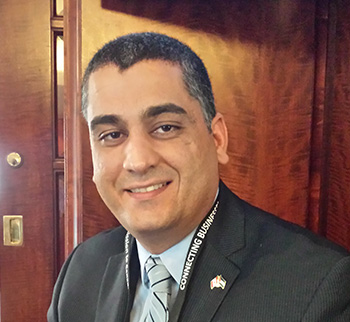Back when he was in the Senate, Jerry Grafstein made the case that the best way to lay the groundwork for peace in the Middle East was to foster economic development in the region. When people have a stake in peace, they are less likely to opt for war, he suggested.
It turns out he wasn’t the only one thinking along those lines. In Israel itself, the local branch of high-tech giant Cisco has embarked on a project designed to help Palestinian society foster development of a middle class. As part of the company’s corporate social responsibility mandate, it’s investing $15 million “for economic development in the Palestinian territories,” said Gai Hetzroni, senior manager of corporate affairs for Cisco in Israel.
Hetzroni was in Toronto last week along with a 25-person delegation of Palestinian businesspeople to meet with Canadian companies that have an interest in their services or products. The Palestinian firms represented the agribusiness, tourism, information communication and technology (ICT) sectors. The trade mission was sponsored by the Canadian-funded Export Development Project, the Palestinian Trade Centre and the Department of Foreign Affairs Trade and Development.
The Palestinian firms attended the Canadian Arab Chamber of Commerce trade show at the International Centre in Mississauga, held business-to-business meetings and laid the groundwork for future co-operation.
For his part, Hetzroni said Cisco first targeted the Palestinian tech sector in 2009, outsourcing several projects to firms in that region. “We’re trying to build the ecosystem that partially exists in the Palestinian territories,” he said.
Cisco also invested in improving “the soft skills” that are part of the international high tech milieu, from the language employed in doing business, to the transparent way companies relate to their clients, to managing people and managing programs. The company’s Israeli employees conduct monthly seminars for Palestinians in Ramallah or in a location on the Dead Sea, Hetzroni said.
To date, there has been plenty of interaction between Cisco’s Israeli employees and staff from Palestinian companies, which have benefited from Cisco’s outsourcing.
“On a personal level, people don’t have any issues. When you talk about politics, it can become problematic,” he said.
Hetzroni, a software developer who also managed Cisco’s R & D, said he’s found a number of similarities between Israeli and Palestinian personnel. “They laugh at the same jokes, their body language is similar and it’s easier to understand each other than it is people from India or China,” he said.
Palestinians “say they need to learn from Israel about building high tech. Many Palestinians have friends in the industry in Israel, and they feel it is wise to do business in Israel,” Hetzroni said.
The Israeli government has facilitated the exchange by granting permits, allowing a fairly free movement of people between Cisco’s office in Netanya and Ramallah in the Palestinian territories.
Hetzroni sees lots of upside in the endeavour. “If the middle class in a good, strong economic shape, then that reduces the level of hate,” he said. “I do it because I believe that providing jobs, a healthy economic environment will reduce tension and help us live in quiet.
“The politicians are not fast enough in the process, so the private sector is following a bottom-up approach. If the business connections are strong enough, the politicians will have to follow,” he said.
One of the Palestinians in the trade mission agrees. East Jerusalem-born Kais Salhut said “economic partnerships are going to be a major contributor to peace.
“It serves a humanistic goal, and being a Palestinian, also a nationalistic goal,” said Salhut, CEO of iConnect Tech, a company with offices in Chicago and Ramallah.
The bottom line, is that it’s also good for business, he added.
* * *
Palestinian Arabs are not the only people benefiting from Cisco’s corporate social responsibility policy.
“Cisco has a program to integrate Israeli Arabs into high-tech industry,” Hetzroni said. “And Cisco supports a program to integrate the ultra-Orthodox into the high tech world.
“The biggest problem with the Israeli economy is that 30 per cent of the population – 20 per cent Arab and 10 per cent Orthodox – are not part of it,” he said.
The unemployment rates in both communities are high, while the education level “is not up to that of the Jewish community.”
Ma’antech, a program founded by Cisco and outgoing President Shimon Peres, is aimed at the Israeli Arab community.
It draws on the support of a coalition of blue chip high tech firms “to make efforts to hire Israeli Arabs,” Hetzroni said.
Kamatech is a similar program geared to the ultra-Orthodox, likewise supported by a group of Israel-based high tech companies. Kamatech provides diversity workshops to the firms to explain the cultural differences they might expect when interacting with ultra-Orthodox Jews. It also runs programs to upgrade the educational standards of Orthodox employees in core subjects, such as math and English.
“We’re trying to bridge the gap,” Hetzroni said.
Cisco’s Networking Academy prepares young members of the Orthodox community to become PC technicians or network administrators, he added.
The company expects to enrol around 400 young people in the program in the next two years.
